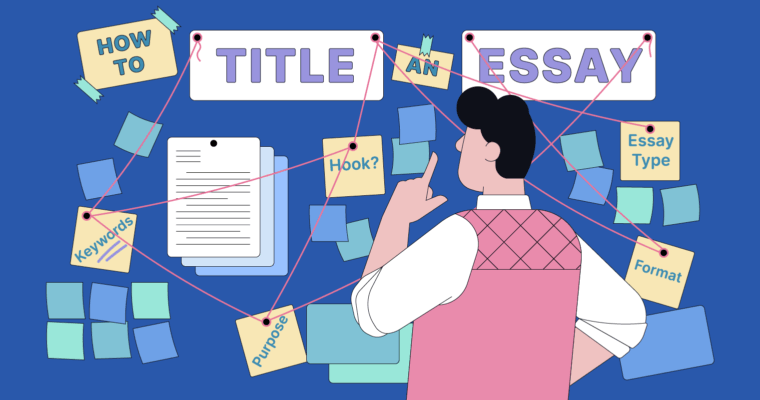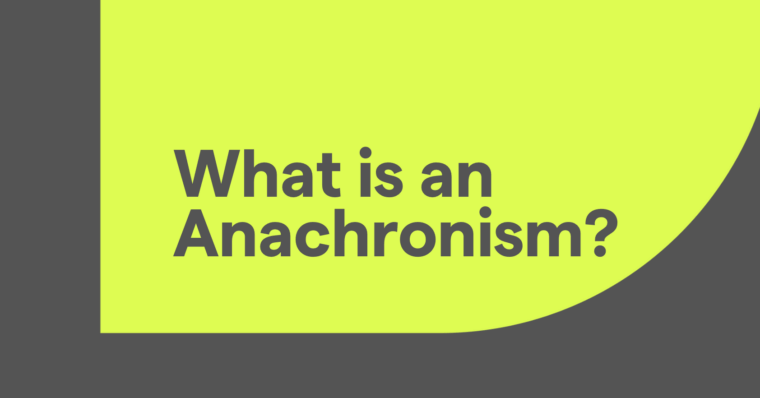
If you read this blog regularly, you’ll notice something about our blog posts’ titles: They all summarize what their post is about. This is so you know exactly what you’ll find in the post, so if you’re looking for specific tips, you know exactly which post to read.
An essay title does the same thing. There are a lot of similarities between essays and blog posts, and one of those similarities is that for the title to be effective, it needs to be concise and clear. It should also contain one or more keywords, which tells readers the essay’s main topic.
What is the purpose of an essay title?
An essay title tells readers what your essay is about. This gives them a heads up on what to expect from the essay and, if they’re reading it to conduct their own research, whether it’s relevant to their area of study.
Ideally, an essay title also catches readers’ attention and stokes their curiosity, prompting them to read your work. How important it is to achieve this depends on the kind of essay you’re writing—if it’s an assigned essay and your instructor has to read it, an engaging title isn’t your top priority. But if you’re submitting your essay to a contest, as part of an application to college or graduate school, or pitching it for publication, it needs a catchy, intriguing title because the title is the first part of your work the editor or admissions committee will see. And depending on the title’s catchiness and other circumstances of your submission, it could be the deciding factor in whether they read your essay.
As we mentioned above, a strong essay title gives a clear preview of what the reader will find in your writing. You don’t have to give it all away, but it should act as a general briefing on what to expect from your work and make them want to continue reading it.
>>Read more: How to Start an Essay: 7 Tips for a Knockout Introduction
What are the rules for essay titles?
Guidelines for essay titles in MLA format
In MLA format, your essay’s title should be in title case. That means every principle word— words that aren’t articles, prepositions, coordinating conjunctions, or the word “to” paired with an infinitive—is capitalized. The only exception to this is when one of these words is the first or last word in the essay’s title. Here’s a quick example:
Looking Through the Rear Window: Perspective in Hitchcock’s Films
Guidelines for essay titles in APA format
Similarly to MLA format, APA format requires essay titles to be in title case. In addition to this formatting requirement, APA requires that essay titles be succinct and specifically not contain any abbreviations or unnecessary words. Here is an example of how an essay title looks in APA format:
Effects of Blue Light on Boston Lettuce Crops
See how straightforward this essay title is? You know exactly what the essay is going to be about: How exposure to blue light impacts growing Boston lettuce crops. Keep in mind that APA format is typically used for scientific and technical work, so it’s unlikely you’ll use figurative language in your title.
Guidelines for essay titles in Chicago Manual of Style format
Chicago style also requires that essay titles be in title case. Other than that, Chicago style doesn’t have specific guidelines for what a title should or shouldn’t include. Here is an example of an essay title in Chicago style:
2021 Returns: What We Projected vs. Actual Returns
How to brainstorm your essay title
When you’re brainstorming for your essay, think about the potential titles you can choose. Jot down your keyword and the kind of essay you’re writing, such as an analytical or compare-and-contrast essay. This won’t only help you determine an effective title, but it can also help you determine the best way to structure your essay.
Stay away from punny or otherwise funny titles unless you’re writing a humorous or personal piece—your creative writing class is probably the only course where that kind of title is appropriate.
Here’s what your essay title should include
- One or more relevant keywords to your subject
- Any other necessary words or phrases that tell the reader what to expect from your essay
- When applicable, a catchy phrase or figurative language
Let’s take another look at the example essay titles from the section above. In the first example, Looking Through the Rear Window: Perspective in Hitchcock’s Films, we have the following elements:
- An attention-grabbing phrase that references one of Hitchcock’s most well-known films
- The keyword “perspective,” which tells us immediately what this essay is about
- Clarity around how the essay specifically explores perspective in Hitchcock’s films and instances where Hitchcock used perspective as a storytelling device
Now take a look at the example APA title essay, Effects of Blue Light on Boston Lettuce Crops. This one is more straightforward and technical. But still, it’s got the key elements that make up a strong essay title:
- A clear preview of exactly what’s in the essay: data on how an environmental factor affects specific crops
- Clear keywords: “blue light” and “Boston lettuce crops”
Additionally, notice how the tone is different from the tone in the MLA essay title. This essay title feels more objective and detached from its subject, giving a preview of the tone the reader will find in the essay.
What not to include in your essay title
It’s usually best to stay away from negative or controversial terms. Do this even if your essay is taking a stand against something or arguing that another position is harmful. Instead, reframe your position using neutral or positive words to avoid potentially offending a reader or undermining your own position by coming across as aggressive or bitter. Compare these two essay titles:
- Why Rerouting Campus Traffic Is a Terrible Idea
- Finding Solutions to Campus Traffic Challenges
See how the second option, the one that avoids negative language, sounds more engaging and promises a more resolution-oriented read? Remember, your reader is supposed to draw their own conclusions from your essay—don’t attempt to do their work for them by telling them what to think in your title.
As you brainstorm titles, write them down so you can revisit them after you complete your first draft. Once you have a finished draft, it can be a lot easier to determine the title that fits your essay best.
Essay title examples
Take a look at these example essay titles and take note of how the tones and vocabulary vary between essay types. A title that’s perfect for a persuasive essay might not be right for a college application or expository essay. And similarly, a title that works for a comparative essay might be too lackluster for a personal or argumentative essay.
Personal essays
Why I’ll Never Wear a Blue Baseball Cap Again
How 20 Years in Corporate America Made Me a Better Parent
Analytical essays
What is Love? How Romantic and Modern Artists’ Answers Differ
Three Reasons Why We Won’t See a Repeat of the 2008 Bubble
Argumentative essays
The Correlation between New School Buildings and Higher Test Scores—Three Stats You Can’t Ignore
Are We Using the Right Success Metrics for Students?
Persuasive essays
Four Ways Free Wi-Fi Will Boost the City’s Economy
Unless We Take Action, This Heat Wave Is Just the Beginning
Compare-and-contrast essays
Dynamite, Profit, and the Pursuit of Power: Chasing White Whales in Moby Dick and Jaws
Outdoor Growth Patterns of Shiitake and Lion’s Mane Mushrooms
College application essays
What Scooping Ice Cream Taught Me about Human Nature
Dancing and Math Are More Similar than You Realize
Essay title FAQs
What is an essay title?
An essay title concisely states what an essay is about.
Why is an essay title important?
An essay title is important because it accomplishes a few things:
- Tells readers what the essay is about
- Catches potential readers’ attention
- Helps researchers sort essays and find the ones most relevant to their work
What should you consider when creating an essay title?
When creating an essay title, think about the essay’s purpose. Then, explain the essay’s subject and purpose in a brief clause or short sentence, making it appropriately intriguing to draw readers’ attention.






